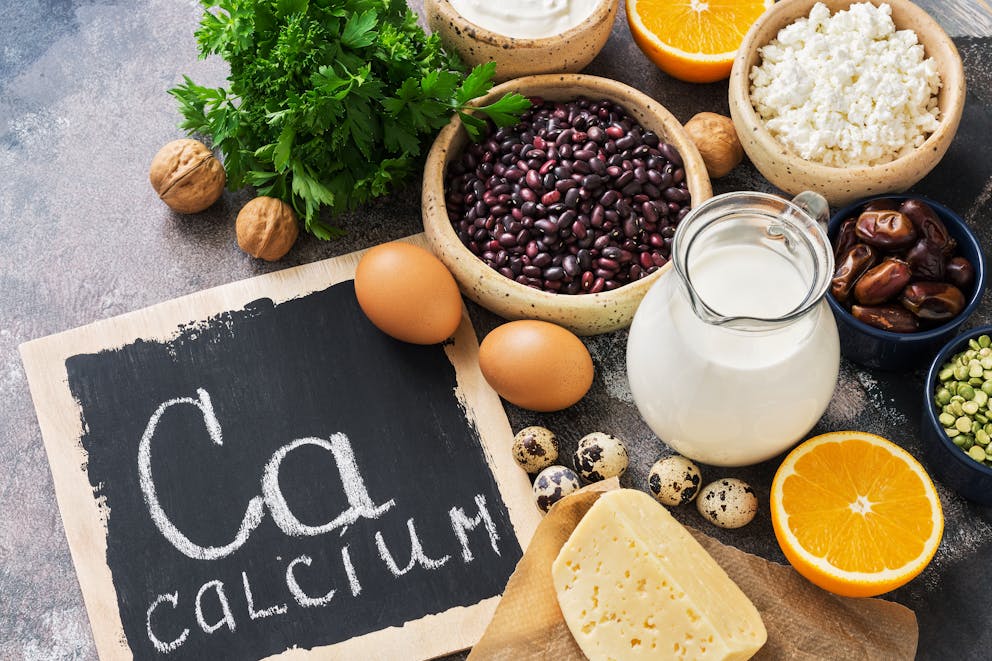While most people know that calcium is important for their health, not many realize that vitamin K2 is equally important if you want your body to use calcium efficiently.
Learn about how vitamin K2 works with calcium, how a deficiency can affect your body, and what you should do to increase your intake.
The Role of Vitamin K2 in Calcium Metabolism
Vitamin K2 and vitamin D3 work together to ensure efficient calcium absorption and distribution for healthy bones. This process is crucial for maintaining strong bones.
Vitamin K2 and Vitamin D3
Vitamin K2 and D3 work together to regulate calcium levels.
But while vitamin D aids in absorbing this mineral from our diet into our bloodstream, the lesser-known partner—vitamin K2—ensures this absorbed calcium gets deposited where we need it most: our bones.

The Importance of Calcium Distribution
Without enough vitamin K2 guiding it towards the bones, excess calcium can stray off course and end up lodged inside arteries or other soft tissues—a scenario that can lead to serious health complications over time.
Vitamin K2's Impact on Vascular Health
Our arteries need to stay flexible so that blood flow levels can be properly managed by the cardiovascular system.
But when calcium deposits build up in these vessels, it can lead to hardening or vascular calcification. That's where vitamin K2 comes into play.
Inhibition of Vascular Calcification
Vitamin K2 directs this essential mineral away from places it doesn't belong like our arteries.
Instead, it helps guide calcium towards areas where we do want it: our bones and teeth. This role is crucial in inhibiting vascular calcification.
Arterial Elasticity and Blood Pressure Regulation
Vitamin K2 has also been shown to improve arterial elasticity.
Flexibility in your blood vessels leads to better blood pressure regulation, which shows why vitamin K2 is so essential.
Consequences of Vitamin K2 Deficiency
Lacking enough vitamin K2 can lead to unpleasant physical changes. Let's discuss these.
Physical Manifestations of Vitamin K2 Deficiency
Stiffness in the body can indicate insufficient vitamin K2, potentially preventing calcium from reaching bones and teeth. This isn't just discomfort - a sign that something is off balance in your system.
Studies have shown that this could be due to the inability of calcium to reach the bones and teeth properly because there isn't enough vitamin K2 to help guide it there.
Hunching over is another symptom you may encounter. This postural change often results from weakened or brittle bones, likely because calcium isn't effectively distributed without sufficient vitamin K2.
The Effect on Jaw Bone, Maxillary Bone, and Teeth
Your jaw, maxillary bone (the upper jaw), and teeth suffer when there’s not enough vitamin K floating around your bloodstream. Research indicates this deficiency can cause dental issues like cavities and potential changes in facial structure.
The Interplay Between Calcium Intake and Vitamin K2
Many people believe that taking calcium supplements is enough to strengthen their bones. Research conducted by Harvard Medical School revealed that increasing dietary calcium intake does not significantly decrease hip fracture risk among women.
This indicates that simply upping your calcium intake isn't the silver bullet for bone health we once thought it was.
The Risks of Calcium Without Vitamin K2
It may be a shock that taking in an excess of calcium without enough vitamin K2 can cause severe health problems.
For instance, a study published in the Journal of Clinical Endocrinology & Metabolism reported an increased risk for heart problems with high-dose calcium supplementation.
Vitamin K2 helps guide this extra calcium into our bones where it's needed most instead of letting it deposit into arteries or organs where it can cause harm. So, next time you reach for those chalky tablets, ensure they include vitamin K2.

Dietary Sources and Supplementation of Vitamin K2
Vitamin K2, an essential nutrient for maintaining bone health and arterial elasticity, is often not present in adequate amounts in the modern diet. Yet, the modern diet often lacks sufficient amounts.
Foods Rich in Vitamin K2:
Grass-fed butter offers high concentrations of vitamin K2 due to its rich fat content.
Cheese from grass-fed cows also delivers substantially because it's made from condensed milk.
Milk directly sourced from grass-fed cattle is also excellent; however, most commercial dairies do not feed their cows with grass, resulting in less vitamin K availability.
Egg yolks are another significant source, but remember that the chicken needs a natural diet, including insects and greens, for optimal nutrient composition.
Supplementing vitamin K2, particularly when paired with vitamin D3, can be beneficial. These two vitamins work together to optimize calcium metabolism, improving bone health.
It’s essential, though, to discuss any supplementation plans with your healthcare provider before starting anything new.
Vitamin K2 and Strokes
Research has suggested a potential connection between vitamin K2 deficiencies and strokes, highlighting its distinctive role compared to vitamin K1.
While vitamin K1 is primarily known for its role in blood clotting, vitamin K2, specifically as menaquinone, offers a unique benefit to cardiovascular health.
It helps regulate calcium metabolism, ensuring that calcium is deposited in bones and teeth rather than building up in arteries. The accumulation of calcium in arterial walls, known as arterial calcification, is a risk factor for strokes and other cardiovascular issues.
Therefore, understanding the difference between vitamin K and K2 becomes critical. Vitamin K2's role in preventing arterial calcification may reduce the risk of strokes, making it a potentially valuable component of a heart-healthy diet and supplementation regimen.
Conclusion
The importance of vitamin K2 in calcium metabolism and overall health cannot be overstated. While calcium is essential for bone strength, vitamin K2 ensures its proper utilization, preventing calcium from accumulating in arteries and soft tissues.
A deficiency in vitamin K2 can lead to various health issues, including compromised bone health and increased risk of cardiovascular problems like strokes.
Incorporating vitamin K2-rich foods and, if necessary, supplementation into your diet can help maintain optimal bone and cardiovascular health.
Understanding the relationship between calcium, vitamin D3, and vitamin K2 is crucial for supporting overall well-being.
